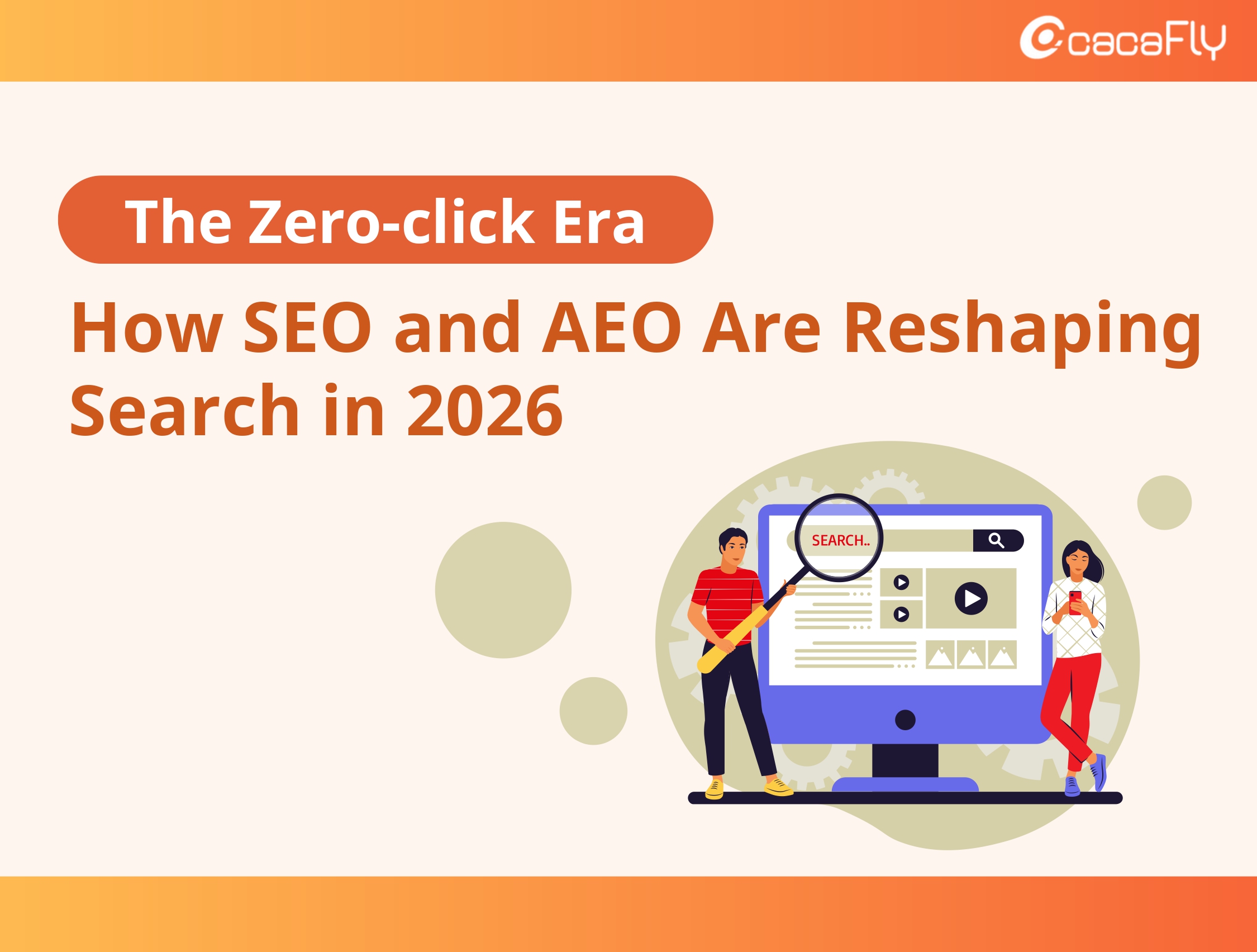In an era where digital technology is rapidly evolving, marketing is undergoing an unprecedented transformation. From generative AI revolutionizing content creation to Generation Z redefining consumer habits and new privacy regulations in a cookie-less world to the rise of omnichannel media matrices—2025 is poised to be a pivotal year in the marketing landscape.
Curious about the remarkable changes awaiting the marketing industry in 2025? This article delves into four significant trends: AI-driven smart marketing, insights into new-generation consumers, data privacy strategies, and content innovation mechanisms, outlining a winning blueprint for brands to thrive amid this digital wave. Join cacaFly Malaysia as we explore the key trends that will reshape the marketing landscape!
Trend One: AI-Driven Smart Marketing and Immersive Experiences
1. Generative AI Reshaping Marketing Processes
Generative AI is profoundly transforming marketing processes, widely applied for efficiently crafting advertising copy and generating visual content such as images and videos. These tools can automatically create creative content that aligns with brand tone based on audience needs, saving time and labor costs while enhancing content precision and creativity, thus attracting consumer attention and facilitating purchase decisions. Additionally, AI-driven personalized recommendations have become a critical aspect of marketing; by analyzing consumers’ browsing histories and purchase records, AI can predict needs in real time and recommend relevant products, significantly improving brand interaction and conversion rates. With AI’s powerful data analysis capabilities, brands can swiftly adjust their marketing strategies to respond to rapidly changing market conditions, ensuring sustained growth.
2. Comprehensive Adoption of Immersive Experiences
As augmented reality (AR) and virtual reality (VR) technologies mature, brands leverage these tools to create rich interactive experiences for consumers. For instance, furniture brands use AR to allow customers to visualize furniture in their homes, while fashion brands offer virtual fitting services. These immersive experiences not only enhance consumer confidence in purchases but also bolster the brand’s innovative image.
Moreover, the rise of the metaverse enables brands to engage consumers more deeply in virtual environments through events like virtual product launches and digital product designs. AI-driven smart customer service systems are also crucial in enhancing customer experiences, providing 24/7 support and personalized recommendations that reduce service costs while strengthening consumer relationships.
Trend Two: Reshaping New Generation Consumption and Omnichannel Strategies
1. Emergence of New Generation Consumer Power
High levels of digital engagement and personalization characterize Generation Z and Generation Alpha. Their shopping journeys often begin on social media platforms like Instagram and TikTok, heavily influenced by creators, KOLs, and social trends. Data shows that 46% of Gen Z prefers searching for products on social media rather than traditional search engines. They prioritize product functionality, a brand’s social responsibility, and sustainability efforts, driving a shift towards personalized and experience-oriented marketing strategies. Brands that analyze consumer behavior data to tailor customized solutions will be key players in capturing this market.
2. Strategic Value of Retail Media Networks (RMN)
Retail Media Networks (RMN) integrate online and offline data to build omnichannel marketing networks that optimize advertising effectiveness while providing deeper consumer insights. The core of RMN lies in real-time data analysis, enabling precise targeting and efficient conversions. Brands can utilize retailers’ first-party data to create relevant ad content, improving conversion rates and enhancing customer loyalty through targeted engagement.
Trend Three: Privacy and Trust as Winning Keys
1. Strategies for a Cookie-less Era
With third-party cookies’ gradual disappearance, brands increasingly rely on first-party data. To encourage consumers to share their data willingly, brands must offer high-value interactive experiences and adopt privacy-by-design technologies such as data minimization and differential privacy. Establishing transparent privacy policies is crucial for building trust; brands should clearly communicate how consumer data is utilized to foster trust relationships.
2. Importance of AI Governance and Data Transparency
The rise of generative AI presents opportunities for brand marketing but also raises ethical and transparency challenges. Studies indicate that 40% of consumers lack trust in AI-generated advertisements; thus, brands must establish clear ethical guidelines regarding AI usage to ensure data reliability and transparency. When leveraging AI for insights or content generation, validating the credibility of training data is vital. Consumers are willing to share their information if brands provide equivalent value in return; quality experiences and tangible benefits will be essential for earning consumer trust.
Trend Four: Comprehensive Upgrades in Content Formats and Channels
1. The Dominance of Short Video Content and UGC Rise
Short videos have become the core content format on social platforms like TikTok, Instagram Reels, and YouTube Shorts, attracting many young users, mainly Gen Z and millennials, who prefer learning about brands through these mediums. User-generated content (UGC) plays a pivotal role in brand marketing; data reveals that 96% of consumers trust UGC, which enhances brand credibility. Brands can accumulate authentic customer feedback by encouraging users to share their experiences, increasing social media exposure, and driving purchases.
Additionally, social SEO becomes more critical as social media increasingly replaces traditional search engines. Platforms like TikTok are emerging as new competitors in search engine usage, with many users seeking product information via social channels. Brands must optimize their social media content to ensure potential customers can discover them effectively by utilizing platform-specific tags, keywords, and video descriptions.
2. Integration of Omnichannel Media Matrix with Private Traffic
As the social media ecosystem evolves, emerging media such as short videos and podcasts become vital tools for brand marketing. Short videos attract user engagement due to their interactivity and visual impact, while podcasts offer more profound storytelling opportunities for brands. The growing demand for interactive content compels brands to rely more on these channels for cross-platform dissemination and content innovation. Brands must tailor their content to each platform’s characteristics to enhance audience interaction.
With diversified marketing channels, private traffic tools such as email marketing (EDM) and SMS marketing are becoming essential strategies. Through precise email lists and high open-rate SMS communications, brands can establish stronger customer relationships. This construction of an omnichannel matrix boosts user loyalty and provides broader avenues for brands to communicate.
Conclusion
As we face the new challenges and opportunities the digital wave brings in 2025, brands must deeply understand four key trends: technological innovation, consumer behavior shifts, data privacy considerations, and content innovation strategies. The proliferation of generative AI, the rise of immersive experiences, the influence of new-generation consumers, the strategic value of retail media networks, and the comprehensive development of short videos and omnichannel matrices inject limitless potential into marketing strategies.
Marketers should leverage technology-driven insights focused on consumer needs while managing data transparently and reliably. Flexibly employing innovative content across diverse channels allows them to forge closer connections with target audiences. Future success will belong to those who swiftly adapt to changes, accurately grasp trends, and continuously optimize strategies.
2025 will be one of innovation and transformation; brands should seize every opportunity to maintain a competitive edge in a fierce market landscape by committing to long-term brand building—ensuring they find stable footholds in future markets while accurately navigating trends and optimizing brand strategies!
Struggling with Brand Development and Marketing?
Reach out to us, and let the professional consultancy team at cacaFly to collaborate with you in creating a brighter future!
Email: [email protected]
Mobile: 017-7486433
cacaFly Malaysia is always at the forefront of digital marketing and committed to being the most reliable partner of our clients, priding ourselves in offering premium services with utmost enthusiasm and professionalism. Specializing in serving brand and performance oriented clients, our one-stop digital marketing services ranges from early research, mid-term advertising, MarTech application and creative production to data analysis and strategy optimization, cacaFly Malaysia has assisted countless brands and online merchant improve their performance and expand their businesses. If you need help with digital marketing strategy, ad placements etc., contact us now! PM us on cacaFly Malaysia Facebook or email us at [email protected]





